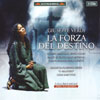Verdi (La) forza del destino
A youthful reading makes a worthy challenger to the old favourites
View record and artist detailsRecord and Artist Details
Composer or Director: Giuseppe Verdi
Genre:
Opera
Label: Dynamic
Magazine Review Date: 1/2007
Media Format: CD or Download
Media Runtime: 177
Mastering:
Stereo
DDD
Catalogue Number: CDS512/1-3

Tracks:
| Composition | Artist Credit |
|---|---|
| (La) forza del destino, '(The) force of destiny' |
Giuseppe Verdi, Composer
Antonio Feltracco, Trabuco, Tenor Giuseppe Nicodemo, Marquis of Calatrava, Bass Giuseppe Verdi, Composer Luca Dall'Amico, Mayor, Bass Lukas Karitynos, Conductor Marco Di Felice, Don Carlo, Baritone Paolo Battaglia, Padre Guardiano, Bass Paolo Rumetz, Fra Melitone, Baritone Renzo Zulian, Don Alvaro, Tenor Romano Franci, Surgeon, Bass Rovigo Teatro Sociale Chorus Silvia Balistreri, Curra, Mezzo soprano Susanna Branchini, Leonora, Soprano Tiziana Carraro, Preziosilla, Mezzo soprano Veneto Philharmonic Orchestra 'G F Malipiero' |
Author: Alan Blyth
This performance from Modena comes with all too little information about its provenance, and not a word about the predominantly young cast and conductor. At any rate the live occasion generates a proper enthusiasm from the audience for the fresh and purposeful reading of the marvellous but sprawling score, which is led by Lukas Karitynos with vigour tempered by a deal of subtlety, tempi always judiciously chosen.
There are no weaknesses among the singers, and several strengths. Most promising of all is tenor Renzo Zulian who tackles the demanding role of Don Alvaro with welcome confidence: there's plenty of brio, self-torture and passion in his vocal portrait of the doomed lover, and his tone and phrasing for the most part are up to the exigent demands Verdi places on his tenor. His baritone adversary Don Carlo is taken with equal strength by the highly promising Marco Di Felice, although in his case vocal power ought more often to be tempered by nuance. Their three crucial duets are the highlight of the performance overall, stirring in their youthful intensity of feeling.
Heroine Leonora is taken with appreciable artistry by Susanna Branchini, culminating in a nicely shaped and felt “Pace, pace”, but though her voice is lovely in quality it develops a beat under pressure, a fault she ought to rectify so early in her career. She is at her best in her Act 2 encounter with Padre Guardiano, one of Verdi's most inspired duets, where she is notably supported by Paolo Battaglia's noble bass: he is the one familiar singer in the cast and a great asset throughout.
The supporting singers are less admirable. Paolo Rumetz is a woofy Melitone and overdoes the comedy. Tiziana Carraro sings a lively Preziosilla, but - like so many mezzos before her - finds the role's wide tessitura a bit of a trial. The smaller parts don't add much distinction to the evening.
You won't find here the vocal quality or experience of the Gardelli (EMI, 6/93R) and Levine (RCA, 10/87R) sets, which wear their years lightly and sport high-class casts, but there is a freshness in this newcomer that made my listening an enjoyable experience.
There are no weaknesses among the singers, and several strengths. Most promising of all is tenor Renzo Zulian who tackles the demanding role of Don Alvaro with welcome confidence: there's plenty of brio, self-torture and passion in his vocal portrait of the doomed lover, and his tone and phrasing for the most part are up to the exigent demands Verdi places on his tenor. His baritone adversary Don Carlo is taken with equal strength by the highly promising Marco Di Felice, although in his case vocal power ought more often to be tempered by nuance. Their three crucial duets are the highlight of the performance overall, stirring in their youthful intensity of feeling.
Heroine Leonora is taken with appreciable artistry by Susanna Branchini, culminating in a nicely shaped and felt “Pace, pace”, but though her voice is lovely in quality it develops a beat under pressure, a fault she ought to rectify so early in her career. She is at her best in her Act 2 encounter with Padre Guardiano, one of Verdi's most inspired duets, where she is notably supported by Paolo Battaglia's noble bass: he is the one familiar singer in the cast and a great asset throughout.
The supporting singers are less admirable. Paolo Rumetz is a woofy Melitone and overdoes the comedy. Tiziana Carraro sings a lively Preziosilla, but - like so many mezzos before her - finds the role's wide tessitura a bit of a trial. The smaller parts don't add much distinction to the evening.
You won't find here the vocal quality or experience of the Gardelli (EMI, 6/93R) and Levine (RCA, 10/87R) sets, which wear their years lightly and sport high-class casts, but there is a freshness in this newcomer that made my listening an enjoyable experience.
Discover the world's largest classical music catalogue with Presto Music.

Gramophone Digital Club
- Digital Edition
- Digital Archive
- Reviews Database
- Full website access
From £8.75 / month
Subscribe
Gramophone Full Club
- Print Edition
- Digital Edition
- Digital Archive
- Reviews Database
- Full website access
From £11.00 / month
Subscribe
If you are a library, university or other organisation that would be interested in an institutional subscription to Gramophone please click here for further information.




